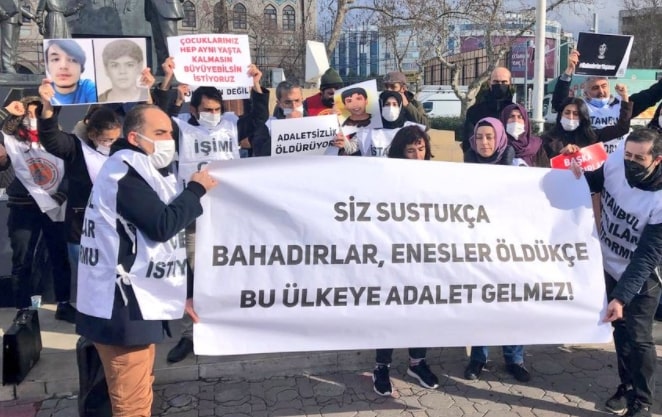A nongovernmental organization founded by victims of Turkey’s post-coup purge held a protest in İstanbul’s Kadıköy district on Tuesday, drawing attention to government policies that drive youngsters in the country to take their own lives, the Bold Medya news website reported on Tuesday.
The protest, organized by the KHK Platforms Union and attended by dozens of people, focused mainly on the recent deaths of 16-year-old Bahadır Odabaşı, who killed himself due to depression caused by the imprisonment of his father in a post-coup purge, and Enes Kara, a 20-year-old medical student who died by suicide due to the pressure and anxiety he experienced at a student apartment run by an Islamic cult.
Emine Yüzgeç, a representative from the organization, said in a press statement that they had gathered for Odabaşı and other youngsters in Turkey who weren’t allowed to live their lives, who grew up behind bars, who experienced social alienation as the children of purge victims, to child workers, to youngsters like Enes whose free will was disregarded and those who died due to government-backed violence.
Kara allegedly died by suicide by throwing himself off the roof of his apartment building on Jan. 10 after posting a video on social media in which he complained about the oppressive methods used by the managers of the apartment where he was staying due to pressure from his parents.
Opposition politicians blamed the ruling Justice and Development Party (AKP), which is known to have close ties to Islamic cults that have been on the rise in Turkey in recent years, for Kara’s death, with some urging the government to shut down all residences linked to Islamic cults.
Odabaşı also died by suicide by allegedly throwing himself from the 10th story of his apartment building due to depression caused by the situation of his father, Nurettin Odabaşı, a former teacher who was fired from his job by an emergency decree and arrested on terrorism-related charges after an attempted coup on July 15, 2016.
The teenager, whose father has been in prison for the past four years, lapsed into depression and took his own life, Turkish media reported.
Yüzgeç said Odabaşı didn’t choose to take his own life but was driven to do it by the AKP government’s policies.
“Bahadır’s parents had been dismissed from their jobs by government decrees. They were tested with poverty, hunger. They experienced social alienation. … His father was imprisoned at a time when Bahadır needed a father figure the most. He couldn’t deal with growing up in the absence of a father,” Yüzgeç said.
She added that those who were responsible for the deaths of purge victims and their children were the government, its supporters and those who remain silent in the face of such incidents.
Following the failed coup, the Turkish government declared a state of emergency and carried out a massive purge of state institutions under the pretext of an anti-coup fight.
According to data provided by Yüzgeç, more than 130,000 civil servants were summarily removed from their jobs for alleged membership in or relationships with “terrorist organizations” by emergency decree-laws subject to neither judicial nor parliamentary scrutiny.
More than 1.5 million people have been investigated on terrorism allegations, 300,000 have been detained and 100,000 have been arrested, Yüzgeç said, adding that at least 100 have died by suicide since the 2016 coup, and at least 38 drowned in the Evros River or the Aegean Sea while trying to flee Turkey to avoid the government crackdown.
Former public servants were not only fired from their jobs; they were also prohibited from working again in the public sector and getting a passport. The government also made it difficult for them to work formally in the private sector. Notes were put on the social security database about dismissed public servants to deter potential employers.
According to a joint report by the Justice for Victims Platform and Ömer Faruk Gergerlioğlu, a human rights advocate and lawmaker from the Peoples’ Democratic Party (HDP), the biggest problem the purge victims and their families have been facing is economic hardship (97.9 percent) followed by psychological problems (88.6 percent), loss of social prestige and social exclusion (83.7 percent), the disintegration of social circles (83.1 percent), unemployment/lack of employment (80.4 percent) and a lack of social security benefits (73.2 percent).



